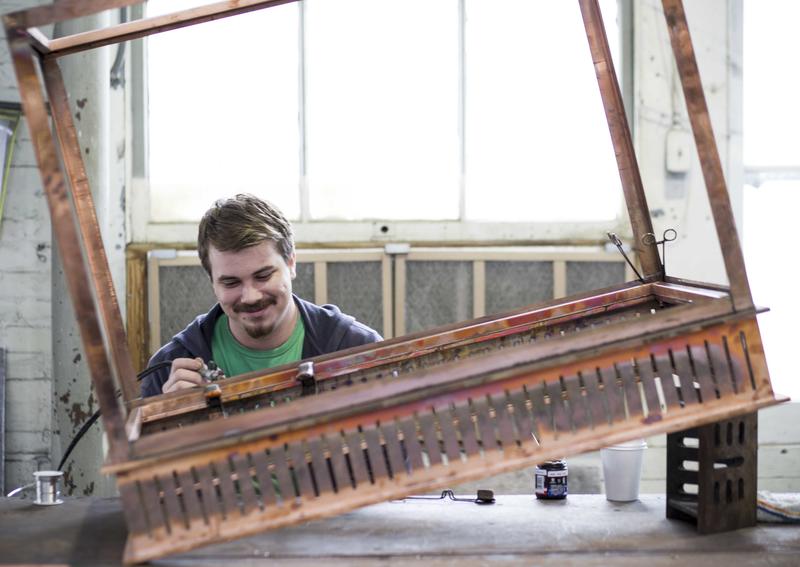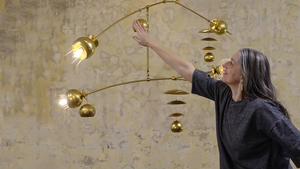Dave Dawson is the CEO and founder of Charleston-based lighting brand The Urban Electric Co., which celebrated 15 years in business in 2018. In his second column for BOH, he shares what he has learned along the way.
My wife and I started our lighting company in a tiny workshop in downtown Charleston, South Carolina. As a former attorney without previous design or manufacturing experience, I had almost no idea what I was doing and, perhaps worse, I had no idea what I wasn’t doing. Fifteen years later, I've learned a lot of lessons—most of them the hard way, whether through trial and error or just plain failure. When Business of Home asked me to share a few, I organized my thoughts into three basic categories: Product, People, and Partnerships. Over the course of three articles, I hope to pass along some of the most useful lessons I’ve learned during these past 15 years. Today, I continue with thoughts on People.

Like a lot of American craft companies, we are a people-centric business—not just because payroll is by far our largest expense and investment—but also because our success and sustainability relies almost exclusively on the passion and creativity of our team. Our care for this strategic resource is mission-critical.
Know Your Purpose: Write It Down and Share It
Even seven or eight years into our existence, I had never taken the time to consciously establish and codify our common purpose and core values. We were too busy simply surviving. A business acquaintance once asked if he could see our core values–and as I stumbled to explain that “We have them, they’re just not written down,” I realized that feeling them wasn’t the same as documenting them. They don’t exist if they aren’t written down.
The reasons for this are simple. For starters, an owner’s sense of purpose and values could be different than the team’s—and if these exist only in your head, that conflict may never be resolved. Achieving broad acceptance within the organization requires consistent reference and repetition, which is virtually impossible without writing down your values.
In recognition of those pitfalls, we now create a one-page document every year that we call our “Blueprint.” This single page combines the core characteristics of Urban Electric (Core Values and Purpose) with our annual planning process (Tactics, Measurements), and then loops all of these pieces together so that each person in the organization can tie their daily activity to a larger purpose. It also reminds us all to not engage in activity that doesn’t align with our purpose.
Establishing and documenting is a huge step forward, but for it to become a part of who the company is, a third step is required: sharing it! Over and over and over again. Believe it or not, this is harder than it sounds. A huge cross-section of our team goes through a painstaking, months-long process to create each annual document, and then we reference it every chance we can. It is discussed at every strategy session, every individual performance review, every town hall and company email. This creates a common language for every person in the company and ensures a unified pursuit of the established values.
Mission and Value
Consciously or not, every company has a culture that’s built around some centralizing principles—sometimes these are uplifting and positive, oftentimes negative and destructive. Knowing that a culture will take root, whether you choose it or not, a smart company proactively selects constructive and “leverageable” principles. At Urban Electric, we’ve chosen to centralize our culture around mission and value.
At a very fundamental level, I believe the currency people value most in a career (apart from a paycheck, which, presumably, they can get lots of places) is to: (a) feel valued and (b) have a sense of mission in their work. These two things, though intangible, matter more to your employees than any benefit you can give them. They’re more important than a nice desk, a benefits package or a company picnic. When people believe in the collective company mission and feel that the organization believes in them, they’ll run through brick walls.
There is hardly anything more powerful than a group of passionate people who have rallied around a shared mission; part of our mission is to revive and sustain artisanal craftsmanship in this country. That’s a bold mission for a little company like ours, but it elevates our viewpoint to something larger than our individual selves. It also provides inspiration for our daily work.
At the same time, people are individuals—so feeling valued at an individual level is also crucial. That’s why we invest heavily in their career development, why we celebrate wins large and small, and why we try to maintain a caring family atmosphere. When people are secure in the knowledge that they are valued by the organization, they feel safe to experiment, push boundaries, and even fail—which inevitably leads to innovation and improvement.
I believe fervently that a culture of mission and value —particularly for a young company or a company full of young people—is paramount to success.

Be Fair, Not Popular
Early on, I wanted to be a popular boss. Over time, I realized that was not only unlikely (because of the general dynamic that exists between a business owner and his or her team), but that it was also the wrong touchstone. I no longer worry about being popular with my team, but I’m always concerned that they trust my sense of fairness. With over 230 employees, complete agreement on any decision I’ve made is a long shot, but I do want them to feel like my decisions are fair.
Case in point: A few years ago, our insurance company told us our craftsmen should no longer listen to music on their headphones while they worked, because it reduced awareness and compromised safety. Headphones had become an ingrained part of their day and taking them away was an extremely unpopular decision. They were all opposed to it. To work through the final decision, we spent a lot of time talking to the craftsmen; we got feedback and explored potential compromises or alternatives. None of those alternatives ended up working out, but when we made the final decision to remove headphones, the craftsmen, though unhappy, felt it was fair because it was a decision that had been thoughtfully made.
A business owner is forced to make unpopular decisions, but if your team trusts that the decision was well-considered, balanced, and with good intention, I believe that’s all you can ask. When that happens, the team is more likely to support a decision or direction even when they consciously disagree with it.
The Golden Rule
Ultimately, whether we’re talking about mission, core values, or a caring culture, I believe in the Golden Rule of building a business: create the type of atmosphere and culture where you, as a business owner, want to work. It’s not only an effective business strategy but—as importantly—it makes for a great atmosphere in which to spend your time and energy.




























